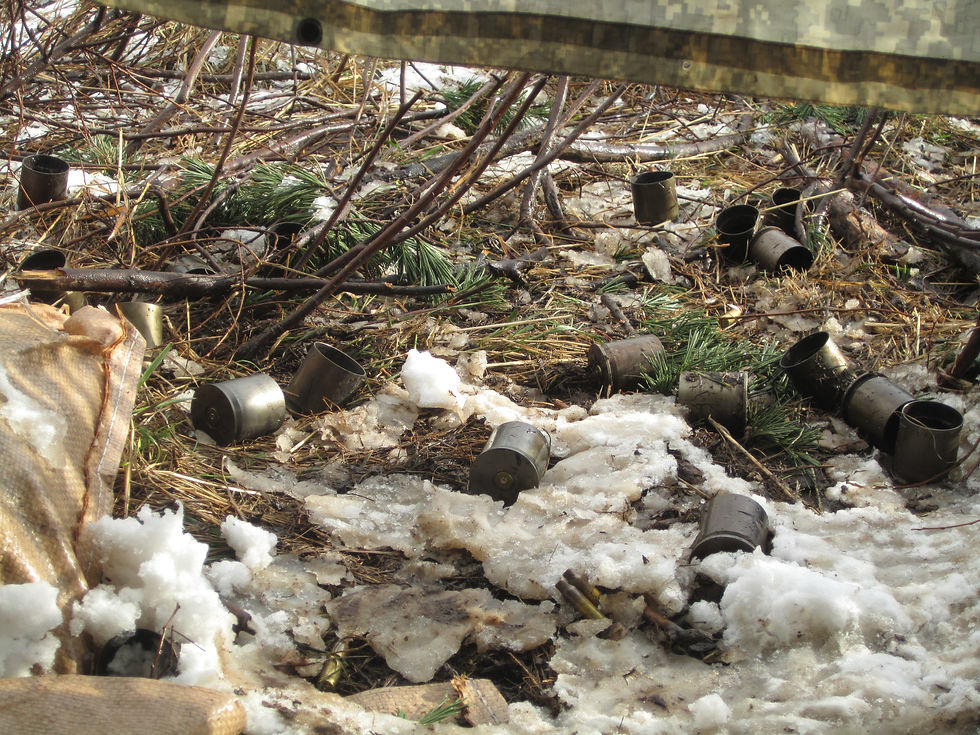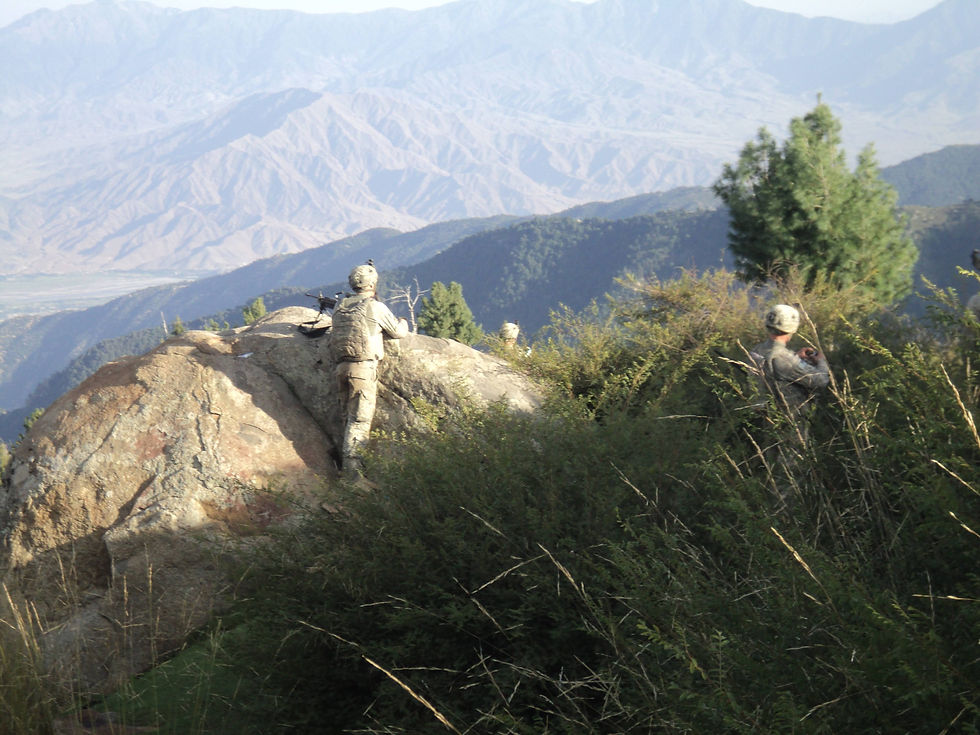An Experience with PTSD
- Tom Gorup

- Feb 1, 2022
- 6 min read
Updated: Aug 26, 2022

Post-traumatic stress disorder (PTSD): a disorder that develops in some people who have experienced a shocking, scary, or dangerous event.
I think we all have probably experienced a "shocking, scary, or dangerous event." These can range from car accidents, to deaths in the family, to an abusive relationship. NIMH (National Institute for Mental Health) describes PTSD symptoms as having one or more of the following:
Re-experiencing symptom
Avoidance symptom
Arousal and reactivity symptoms
Cognition and mood symptoms
I encourage you to read, at least, the "Signs and Symptoms" section of the link above to get an idea of each of these symptoms. The list began to build a pulse as I made my way through the list. I felt a lot of these symptoms pulsing through my body as I read the descriptions. I'm not going to go through the entire list in here for many reasons, but I did want to share a few that maybe others, with shared experiences, might still struggle with as well.
Avoidance symptom: Staying away from places, events, or objects that are reminders of the traumatic experience
Arousal and reactivity symptoms: Feeling tense or “on edge”
Cognition and mood symptoms: Distorted feelings like guilt or blame
Each of these are daily, at minimum weekly, struggles for me. It's interesting how quickly some of these slip into your day without you even noticing it. One minute everything seems fine and the next...well, it's not. There's this tug. The problem is I can't always tell if that tug was letting me know everything really isn't fine or if that tug was just the beginning of things not being fine. Have I been this frustrated, short, depressed all day, all week, all month?
Staying away from places, events, or objects that are reminders of the traumatic experience
Some might find this silly but 4th of July, or any holiday that includes fireworks, gets me every time. I want to go watch and enjoy the fireworks with my family; I typically can but there's this anxiety that often comes with it. Hearing fireworks in the distance reminds me of hearing a battle kicking off in the nearby distance. This sound brings me right back to Afghanistan.

I can see the mountain side as I peer out looking in the direction of the sounds of gun fire and explosions. I want to run to that sound because I know there are brothers in danger. That feeling of running toward the sound doesn't come without anxiety. Knowing you're about to run into a fight brings its own set of feels, no matter how 'tough' or brave you think you are.
So, I often find myself attempting to stay away from events that trigger this feeling, but sometimes you just can't get away from it. Just the other day I was at the grocery store with my kids. We were standing in line at the checkout. It was just us and a group of 4 or 5 teenage boys in front of us. About 10 to 15 feet behind me is where they blow up balloons customers have purchased. Well, I'm sure you've already guessed it already, one of them popped. In the line at the grocery store, in front of my kids, the teenage boys and the clerk I dropped to a knee and swept my kids behind me. I was only mildly impressed with my response as I quickly became embarrassed by my actions. Then almost immediately frustrated, angry, then embarrassed again, and then...sad, all in a matter of seconds.
I stood up and attempted to carry on as if nothing happened, but I could feels eyes on me. I moved forward and we went home. I did something different this time though, I told my wife. She sympathized and did her best to make sure the rest of the day had minimal stress for me. I can say, I am one lucky man. She knows what's best for me and she picks up on these moods FAST! Which leads me to the next one.
Feeling tense or “on edge”
This is the one that creeps up on me. I don't even realize how tense or how "on edge" I really feel until my wife asks me, "are you OK?" As you might imagine the question itself frustrates me. "Why is she asking if I'm OK? Do I not look OK? Of course I'm OK." Questions and responses cycle in my head as I become more and more frustrated. It's taken some time to start recognizing this pattern. I'm a bit faster at noticing when I'm not OK and only mildly better at admitting it. For me it's picking up on when I'm spiraling. Noticing when my head starts going down this path of questions and answers, when my blood pressure begins to rise, and when sarcasm starts to form at the tip of my tongue. I have to pick up on these things in order to stop myself. My initial reaction is typically to try and tuck it away. Respond with, "I'm fine", when I know I'm not. Other times I try to remove myself from the situation and find something to occupy myself with no interruptions. But you know what happens? I get interrupted. Having 2 kids, 7 and 9, provides a level of certainty that interruptions will happen. As you might imagine these interruptions results in more frustration.
I'm guessing it's easier for others to pick up on this transition to frustration than I might think. I think even my kids have started to taken notice these days. So, I try to acknowledge it. If I'm honest with myself, it helps. It makes me sad and a bit depressed to acknowledge it, but the bout seems to not last as long when I do. Again, my wonderful wife, armed with that knowledge, will do whatever she can to reduce other stressors that might come my way.
Distorted feelings like guilt or blame
This is one of those feelings that I know doesn't warrant the time I give it, but that doesn't change how how quickly I can be consumed by it. Deep down I know that it doesn't make much sense, this guilt, but man...is it hard to shake the thoughts. The thoughts of "that should have been me?", "I should have been there.", "why didn't I do more?" They all give me the shake down.
A big one for me has been the day one of our soldiers became paralyzed. I delayed my mid-tour leave until the very last minute (think of mid tour leave as a 2-week vacation from the 12+ month deployment). I think I was about 9 months in before I took it. I just didn't want to leave my brothers; I felt I needed to be there at all times. If it were up to me I wouldn't have taken it at all. Well, the night before I was due to fly out our platoon was called out as QRF (Quick Reaction Force) to support another element under attack. The team went out and executed as we had done many times prior. However, this time I wasn't allowed to join them. My flight was only hours away and leadership wasn't willing to risk it. Well, on the way back from the mission my vehicle went off a bridge and landed top side down. The soldiers were quite shook up and one ended up being paralyzed. Every other time that vehicle left the wire was under my command and the one time it wasn't it flips over and a brother was paralyzed. Man that hurts, "that should have been me?", "I should have been there.", "why didn't I do more?"
This is guilt. But it's guilt for something I had no control over. Our Chaplain described this best as a 'Totem of Guilt'. People, not just soldiers, carry more weight in their rucks than they need to. He said to me once, "I've never had anyone apologize or give an excuse to me for not being a plumber." Civilians carry guilt for not joining the military, soldiers that never deployed carry guilt, soldiers that deployed but saw no combat carry guilt, those that saw combat but were not injured carry guilt, those that were injured but still have limbs carry guilt, and even those that lost limbs but are still alive carry guilt. None of that guilt is justified and is dead weight. We all have a purpose and plan for our lives and should not be carrying the weight of guilt for things that we have no control over. I have to remind myself of this ALL THE TIME. I don't know if it will ever go away, but I am able to have a healthier response with practice.
So, why did I write this post? Those that are reading this that were just curious I applaud you for getting through the post. I hope this shed a bit of light on something that may have seemed obscure before. Those that are reading this with loved one's that might be managing their PTSD, I pray you have also gained some insights into why they might react the way they do. Please know there is hope. And for those that have shared experience, that know first hand of what I'm talking about, I have a few things to say to you. First, someone is likely reading this that loves you, is curious, and wants to help. Second, you are worthy of that help and I ask that you not be too proud to accept it. Third, you are not alone.
If you want to talk, need some help, or know someone who might need some help; reach out.
If you're reading this as someone who was curious, consider helping us support our Veterans; consider donating.






Comments